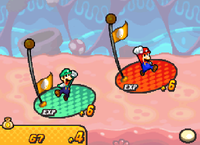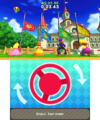Flagpole: Difference between revisions
| Line 29: | Line 29: | ||
===''Mario & Luigi'' series=== | ===''Mario & Luigi'' series=== | ||
[[File:MLBISPostBattleScreen.png|thumb]] | [[File:MLBISPostBattleScreen.png|thumb]] | ||
As of ''[[Mario & Luigi: Bowser's Inside Story]]'', when Mario, Luigi, Bowser (in ''Mario & Luigi: Bowser's Inside Story''), or [[Paper Mario (Mario & Luigi: Paper Jam)|Paper Mario]] (in ''[[Mario & Luigi: Paper Jam]]'') gain [[Experience Point]]s, flagpoles appear as the EXP meter; when the flag gets to the top of the pole, they [[level up]]. In ''Mario & Luigi: Bowser's Inside Story'', the flags on each pole are yellow, and rectangular-shaped with mushroom emblems. Starting with ''[[Mario & Luigi: Dream Team]]'', and following ''[[Mario & Luigi (series)|Mario & Luigi]]'' games, the flags are {{wp|Swallowtail (flag)|swallowtail-shaped}}, and bear Mario and Luigi's respective colors and emblems. Paper Mario's flag in ''Mario & Luigi: Paper Jam'' is yellow and bears a yellow "P" emblem. | As of ''[[Mario & Luigi: Bowser's Inside Story]]'', when Mario, Luigi, Bowser (in ''Mario & Luigi: Bowser's Inside Story''), or [[Paper Mario (Mario & Luigi: Paper Jam)|Paper Mario]] (in ''[[Mario & Luigi: Paper Jam]]'') gain [[Experience Point]]s, flagpoles appear as the EXP meter; when the flag gets to the top of the pole, they [[level up]]. In ''Mario & Luigi: Bowser's Inside Story'', the flags on each pole are yellow, and rectangular-shaped with mushroom emblems. Starting with ''[[Mario & Luigi: Dream Team]]'', and following ''[[Mario & Luigi (series)|Mario & Luigi]]'' games, the flags are {{wp|Swallowtail (flag)|swallowtail-shaped}}, and bear Mario and Luigi's respective colors and emblems. Paper Mario's flag in ''Mario & Luigi: Paper Jam'' is yellow and bears a yellow "P" emblem. Early on, the poles are round and crooked, though in''[[Mario & Luigi: Brothership]]'', they are perfectly straight and thus more resemble Goal Poles. | ||
{{br}} | {{br}} | ||
Revision as of 14:15, January 31, 2025
- This article is about flagpoles in general. For the specific flagoles that mark the ends of stages, see Goal Pole.
| Flagpole | |||
|---|---|---|---|
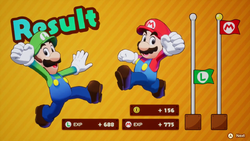 Mario and Luigi with flagpoles in Mario & Luigi: Brothership | |||
| First appearance | Super Mario 64 (1996) | ||
| Latest appearance | Mario & Luigi: Brothership (2024) | ||
| Variant of | Pole | ||
| |||
Flagpoles[1] are objects that are seen in several games of the Super Mario franchise. A majority of them take inspiration from the Goal Poles (themselves often just called "flagpoles" or "poles") seen at the end of stages in Super Mario Bros. and most of the platforming games following New Super Mario Bros., but lack certain mechanics such as getting points for landing high on them. Some of these even appear at the ends of stages, but are not the specific stage goal themselves. Most of the time, they can be climbed like typical poles.
History
Super Mario series
Super Mario 64
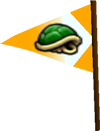
During the development of Super Mario 64, the traditional level-end flagpoles were considered to be used for stage goals,[2] but were replaced with Power Stars to better fit with the game's 3D sandbox style. As such, flagpoles have a drastically reduced presence in the finished product compared to the traditional ones, only appearing as the goal points for Koopa the Quick's races. Here, the flags are yellow with an image of a Koopa Shell and take up most of the poles, which are much shorter than the goal-type poles. They can be climbed like miscellaneous poles and trees, including the ability to vault from the top of them.
Super Mario Sunshine
In Super Mario Sunshine, flagpoles have the same role as in Super Mario 64. They are now used for Il Piantissimo's race, and are red with an image of a blue Pianta on them. Their height is more in-line with the traditional goal flagpoles from the 2D games, though the flag is still much larger compared to the pole.
Super Mario Galaxy
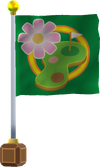
In Super Mario Galaxy, flagpoles appear at the end of Rolling Ball segments and are green with a picture of a golf course on them. The pole itself and the block it is attached to are visually based off the original flagpoles from Super Mario Bros., though they are much smaller. Mario is again able to climb them. Similar poles with the same blocks on the bottoms appear in Bowser Jr.'s Airship Armada, but lack flags.
Super Mario Galaxy 2
In Super Mario Galaxy 2, the same type of climbable flagpole from the previous game appears, now with a Bowser-themed Jolly Roger appear. They appear in Bowser's Lava Lair, Bowser Jr.'s Boom Bunker, and the Throwback Galaxy, often with a Life Mushroom or 1-Up Mushroom at the top. The otherwise-identical flagless poles appear again, often in similar areas and with the same roles, and the ones at the end of Star Ball segments also lack the flag now. One of these flagless poles even has a target for cannon shots at the top of it.
Mario Party 8
In the Mario Party 8 minigame Crank to Rank, flagpoles with the Star Carnival emblem shown on them appear. The minigame returns in Mario Party: The Top 100.
Mario & Luigi series
As of Mario & Luigi: Bowser's Inside Story, when Mario, Luigi, Bowser (in Mario & Luigi: Bowser's Inside Story), or Paper Mario (in Mario & Luigi: Paper Jam) gain Experience Points, flagpoles appear as the EXP meter; when the flag gets to the top of the pole, they level up. In Mario & Luigi: Bowser's Inside Story, the flags on each pole are yellow, and rectangular-shaped with mushroom emblems. Starting with Mario & Luigi: Dream Team, and following Mario & Luigi games, the flags are swallowtail-shaped, and bear Mario and Luigi's respective colors and emblems. Paper Mario's flag in Mario & Luigi: Paper Jam is yellow and bears a yellow "P" emblem. Early on, the poles are round and crooked, though inMario & Luigi: Brothership, they are perfectly straight and thus more resemble Goal Poles.
Gallery
Additional names
Internal names
| Game | File | Name | Meaning
|
|---|---|---|---|
| Super Mario 64 DS | data/normal_obj/obj_race_flag/ | RACE_FLAG | Race Flag |
| Super Mario Galaxy Super Mario Galaxy 2 |
ObjectData/FlagTamakoro.arc | FlagTamakoro | Rolling Ball Flag |
Names in other languages
| Language | Name | Meaning | Notes |
|---|---|---|---|
| Japanese | ゴール[3] Gōru |
Goal |
References
- ^ Pelland, Scott, and Dan Owsen (1996). Super Mario 64 Player's Guide. Nintendo of America (American English). Page 21.
- ^ Interview between Satoru Iwata and Koichi Hayashida regarding Super Mario 3D Land:
Iwata: The impression the goal pole makes has a big influence over the impression that the game makes. I suppose he thought this was an area that deserved effort.
Hayashida: Later, I asked (Yoshiaki) Koizumi-san, and he said that they tried a goal pole once for Super Mario 64.
Iwata: Oh, is that so.
Hayashida: But at the time, when they thought about what was the most fun about playing in 3D, it was going to all sorts of places and looking for something, so they decided on players getting a Star. - ^ 「任天堂公式ガイドブック スーパーマリオ64」 (Nintendo Kōshiki Guidebook – Super Mario 64). Shogakukan (Japanese). Page 12, 80.
